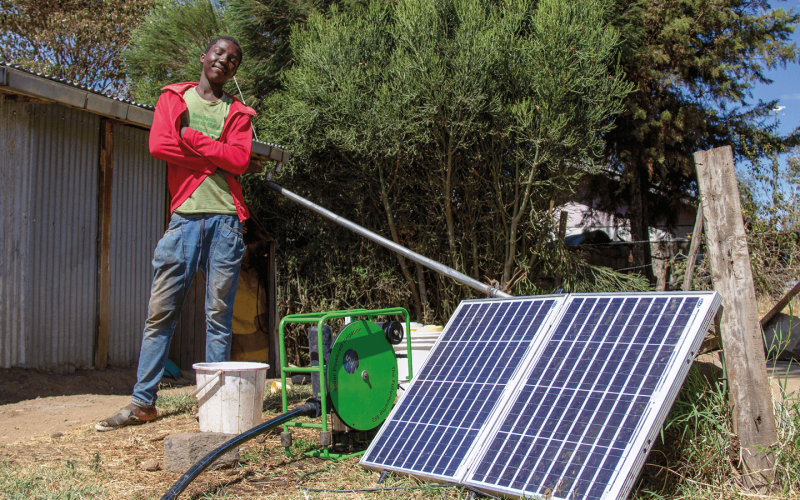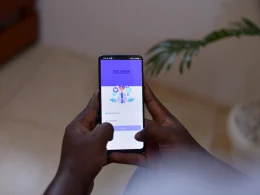By Mark Kawalya
Solar-powered irrigation is providing a lifeline to subsistence farmers in Kenya, a country that faces varying degrees of rain scarcity throughout the year. According to statistics, 80 percent of the land experiences low and unpredictable rainfall leading many farmers to move away from rain-fed agriculture in favour of artificial methods of crop irrigation.
SunCulture, a company based in the US is leveraging solar technology to turn the luck of subsistence farmers in some of the arid parts of Kenya. The company deploys a system that uses solar power water pumps that move water from its source into raised tanks. The resultant force of gravity moves the water through irrigation pipes that are lined in a parallel format in the garden, with emitters controlling the flow of water jets to targeted areas.
One of the beneficiaries of SunCulture’s irrigation system is Alice Migwi a farmer from Limuru which is found in central Kenya. She lauds the solar system as having increased her crop yields, cut her fuel consumption, saved water and cut down on her labour costs.
“I needed a more efficient system to manage the watering of crops,” says Ms. Migwi, who began by planting staples such as spinach and carrots but is now growing mulberries and capsicum, which generate greater returns. “It would take over an hour for the watering process, and now it is 15 minutes.”
SunCulture’s Chief executive and co-founder Samir Ibrahim says his company is a pioneer in commercializing a workable solar-powered irrigation system in Africa. Apart from selling the irrigation assemblies, the firm provides after-sale services like maintenance and support to farmers. The firm was started after Ibrahim and his friend Charles Nichols decided to start a company that would help East African farmers boost crop yields using renewable energy.
“Most of Kenya’s farmland is unsuited to agriculture that depends on regular rainfall, with just 5.4m hectares capable of growing crops,” says Ibrahim, “More than 80 percent of this land needs irrigation to be productive, but only 4 percent of Kenyan farmers irrigate. This limits the country’s ability to guarantee food supplies and also the earning power of many farmers.”
However, the biggest challenge for farmers is the startup cost of buying SunCulture’s irrigation system. For one acre of farmland, it costs $3000 to set up the crop watering system which is prohibitive and out of reach for many farmers.
“I had savings and that has helped me to buy the technology,” says Ms. Migwi. “I worked in the corporate sector for 15 years. But for the average farmer, it is still too expensive.” Ibrahim understands that the cost is still high for most farmers, and says that the firm is working to develop affordable new products that farmers can use.
By Mark Kawalya
Solar-powered irrigation is providing a lifeline to subsistence farmers in Kenya, a country that faces varying degrees of rain scarcity throughout the year. According to statistics, 80 percent of the land experiences low and unpredictable rainfall leading many farmers to move away from rain-fed agriculture in favour of artificial methods of crop irrigation.
SunCulture, a company based in the US is leveraging solar technology to turn the luck of subsistence farmers in some of the arid parts of Kenya. The company deploys a system that uses solar power water pumps that move water from its source into raised tanks. The resultant force of gravity moves the water through irrigation pipes that are lined in a parallel format in the garden, with emitters controlling the flow of water jets to targeted areas.
One of the beneficiaries of SunCulture’s irrigation system is Alice Migwi a farmer from Limuru which is found in central Kenya. She lauds the solar system as having increased her crop yields, cut her fuel consumption, saved water and cut down on her labour costs.
“I needed a more efficient system to manage the watering of crops,” says Ms. Migwi, who began by planting staples such as spinach and carrots but is now growing mulberries and capsicum, which generate greater returns. “It would take over an hour for the watering process, and now it is 15 minutes.”
SunCulture’s Chief executive and co-founder Samir Ibrahim says his company is a pioneer in commercializing a workable solar-powered irrigation system in Africa. Apart from selling the irrigation assemblies, the firm provides after-sale services like maintenance and support to farmers. The firm was started after Ibrahim and his friend Charles Nichols decided to start a company that would help East African farmers boost crop yields using renewable energy.
“Most of Kenya’s farmland is unsuited to agriculture that depends on regular rainfall, with just 5.4m hectares capable of growing crops,” says Ibrahim, “More than 80 percent of this land needs irrigation to be productive, but only 4 percent of Kenyan farmers irrigate. This limits the country’s ability to guarantee food supplies and also the earning power of many farmers.”
However, the biggest challenge for farmers is the startup cost of buying SunCulture’s irrigation system. For one acre of farmland, it costs $3000 to set up the crop watering system which is prohibitive and out of reach for many farmers.
“I had savings and that has helped me to buy the technology,” says Ms. Migwi. “I worked in the corporate sector for 15 years. But for the average farmer, it is still too expensive.” Ibrahim understands that the cost is still high for most farmers, and says that the firm is working to develop affordable new products that farmers can use.








